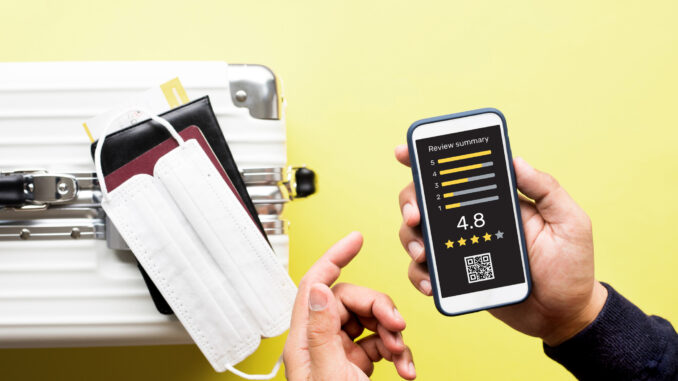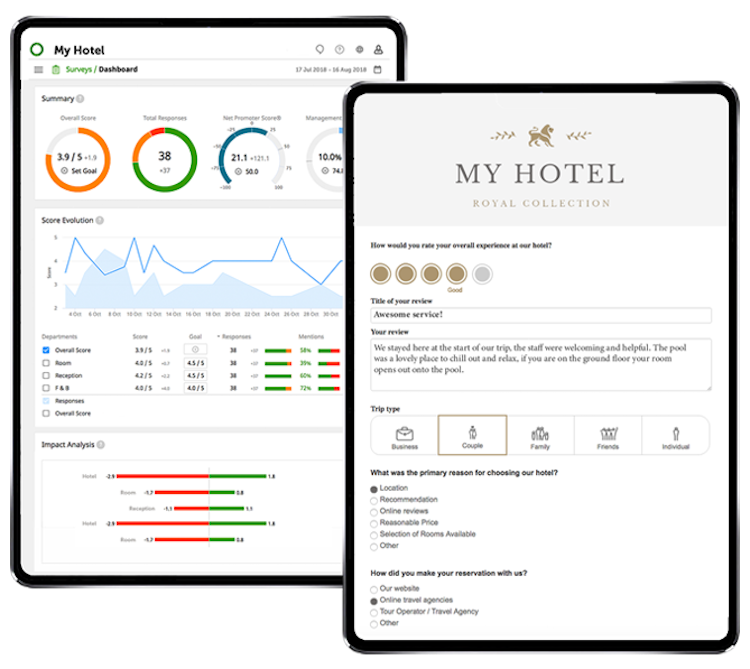
By Larry and Adam Mogelonsky - 1.3.2022
Obvious to everyone, travel habits have changed immensely since the start of the pandemic. Even as international travel resumes in earnest between Europe and the United States to offer a bullish outlook for a solid return of global travel numbers in 2022, what we’re seeing is a vastly increased importance of third-party reviews, with many factors contributing to this trend.
Chief among them, as part of this ongoing ‘great reset’ that the pandemic has brought about, COVID-19 has caused travelers to rethink not only where and how they travel, but also how they find and evaluate their accommodations. With fears of the virus still very much top of mind among large swaths of the world, brand trust is paramount, and this has helped lead hotel reviews to now be the third most important booking driver after location and price.
Location is a given while price is more a function of market forces, branding and amenities, for which your team likely already has a rolling strategy to grow rate, refine marketing plans and build a capex budget for long-term PIPs. With location and price largely outside of your immediate control, this leaves hotel reviews as the primary item that you can work in the short-term to improve.
Good reviews mean a faster recovery and more revenue on the books. When considered in tandem with the current labor shortages, what’s apparent is that achieving this goal requires the development of solid processes and a strong tech backbone so that your teams can promote better reviews as guests return without hampering anyone’s productivity in other areas.
Actively Generating Good Reviews with Tech
We see the current state of hotel reviews as a ripe opportunity where properties can get more quick wins to drive revenues throughout 2022. Particularly with the pandemic continuing to echo through the news cycle, domestic and international travelers need reassurance before booking, and curating great reviews is something wholly within the hotelier’s control. Instead of being reactive, though, it is possible to become proactive to rebuild that consumer trust directly with a hotel brand.
Similar to our approach to dealing with other repercussions of this ongoing labor shortage, we see technology as the savior. Automation not only expedites basic tasks so that teams can focus on servicing in-house guests, but it also speeds up the team’s error recovery abilities and review response processes. In this sense, hotel review platforms that continually drive new and stellar reviews should be deemed an essential entity for the tech stack going forward because of how influential reviews have become combined with the labor shortage which dampens a property’s capacity to effectively manage this task.
To learn about how to shift from the defense to the offense, we touched base with Michael Kessler, CEO of ReviewPro, to see what features hoteliers should be cognizant of that will help to both suppress negative reviews and boost positive ones.
“While the pandemic continues to hamper global travel, we are hopeful for a ‘great reopening’ in 2022,” noted Kessler. “Guests tend to prioritize recent reviews, and this is especially more so since the pandemic; they need to be reassured as things are changing weekly. For example, how the property has responded to the pandemic in terms of health and safety and whether or not the current reality at the hotel lives up to what’s stated on the website. Now is the time for hotels to set themselves up to get as many fresh, and good, reviews.”
Tech Tool to Cultivate Good Reviews
While discussing this notion of the great reopening with Kessler, we demoed the ReviewPro platform then amalgamated our thoughts with a few other products to come up with five key features to guide a hotelier’s decision in terms of the accruing real benefits – that is, revenues – from these systems.
- All in one platform. A property that’s short-staffed also means that no one has time to learn and regularly check a slew of different software. Teams have to be uber-time-efficient, with the ability to see all reviews as well as quickly execute follow-up actions from one central hub.
- Guest survey integrations. The best way to improve a hotel’s online reputation is to first look at guest satisfaction scores. For this, having an automated system to help with error recovery via in-stay surveys and to generate analytical reports from post-stay surveys will respectively prevent negative reviews from reaching third-party websites and give you actionable insights on how to improve the product in a way that’s meaningful to the guest.
- Improved third-party reviews. Besides the in-house automation, the next step is to build APIs to the hotel’s outward-facing review sites, namely TripAdvisor and the OTAs. First and foremost, this aids in catching negative reviews and responding to those criticisms (which guests also evaluate when booking). An important second is the data accumulation whereby an API feeds more information back to the hotel for analysis and, similar to GSS, actionable insights to improve the guest experience and help move the property up the online rankings.
- Again, the labor shortage means that teams are overloaded with tasks, and yet at the same time customers want answers immediately lest they opt for the competitor that does in fact respond right away. Having some machine-learning bots to reply to repetitive questions in the nick of time ensures that you don’t suffer from a mass of abandoned inquiries. One case study Kessler cited showed that, for a chain of over 800 hotels, 91% of emails and messages constituted the same 18 questions, while at the same time over 50% of prearrival and in-stay requests on OTA platforms went unanswered, presenting a clear opportunity for automation to help with guest satisfaction.
- Social media (SM) and text (SMS) integrations. Millennials and Gen Z prefer communicating via these channels over phone or email. While your team may be trained and better suited for the latter, you nevertheless have to meet the customers where they want. This applies to reservation inquiries (such as through Instagram’s DM), but it also means integrating SM and SMS so that your team can reply faster and from that aggregated platform in order to track conversations and SM reviews.
In sum, there will be a “great reopening” as Kessler mentioned. Travelers nowadays are carefully evaluating their accommodation options before booking, which means that first they will want to see how the hotel is performing from a service and brand standards level – namely, what the most recent reviews are saying. If your property isn’t supported by a series of great, recent online reviews then there’s a good chance that guests will book somewhere else. Hopefully, though, from the above you can see that this is one of the easier problems for any hotel to fix.

Larry and Adam Mogelonsky represent one of the world’s most published writing teams in hospitality, with over a decade’s worth of material online. As the partners of Hotel Mogel Consulting Limited, a Toronto-based consulting practice, Larry focuses on asset management, sales and operations while Adam specializes in hotel technology and marketing. Their experience encompasses properties around the world, both branded and independent, and ranging from luxury and boutique to select-service. Their work includes six books “Are You an Ostrich or a Llama?” (2012), “Llamas Rule” (2013), “Hotel Llama” (2015), “The Llama is Inn” (2017), “The Hotel Mogel” (2018) and “More Hotel Mogel” (2020). You can reach Larry at larry@hotelmogel.com or Adam at adam@hotelmogel.com to discuss hotel business challenges or to book speaking engagements.
This article may not be reproduced without the expressed permission of the authors.
Are you an industry thought leader with a point of view on hotel technology that you would like to share with our readers? If so, we invite you to review our editorial guidelines and submit your article for publishing consideration.
